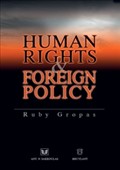 This book analyses the relationship between human rights and foreign policy. It focuses on the integration of human rights in foreign policy-making in the case of the European Union. The argument posited here, is that considerations for human rights in third countries and democracy-promoting policies constitute expressions of the common values shared between EU Member States. These policies reflect their democratic norms and are part of the EU’s wider project to promote co-operation and integration in order to move closer towards a security community and democratic peace between like-minded states. The EU’s human rights policies have developed, in spite of numerous challenges and shortcomings, largely because institutions matter. The EU institutions have enabled the adoption of common positions; they have provided narratives of mutual identification between the Member States; they have initiated innovative human rights projects through networks with non-state actors and have elaborated policy instruments to this effect. Through these, they have challenged traditional state-centric approaches to foreign policy-making. The conjunction of these elements, it is argued, has further influenced the Member States’ understanding and perception of their interests, which in turn has been reflected in a virtuous cycle of institutionalised, committed and increasingly determined promotion of human rights in their external relations.
This book analyses the relationship between human rights and foreign policy. It focuses on the integration of human rights in foreign policy-making in the case of the European Union. The argument posited here, is that considerations for human rights in third countries and democracy-promoting policies constitute expressions of the common values shared between EU Member States. These policies reflect their democratic norms and are part of the EU’s wider project to promote co-operation and integration in order to move closer towards a security community and democratic peace between like-minded states. The EU’s human rights policies have developed, in spite of numerous challenges and shortcomings, largely because institutions matter. The EU institutions have enabled the adoption of common positions; they have provided narratives of mutual identification between the Member States; they have initiated innovative human rights projects through networks with non-state actors and have elaborated policy instruments to this effect. Through these, they have challenged traditional state-centric approaches to foreign policy-making. The conjunction of these elements, it is argued, has further influenced the Member States’ understanding and perception of their interests, which in turn has been reflected in a virtuous cycle of institutionalised, committed and increasingly determined promotion of human rights in their external relations.
Link to the editor.
Author: Ruby Gropas


